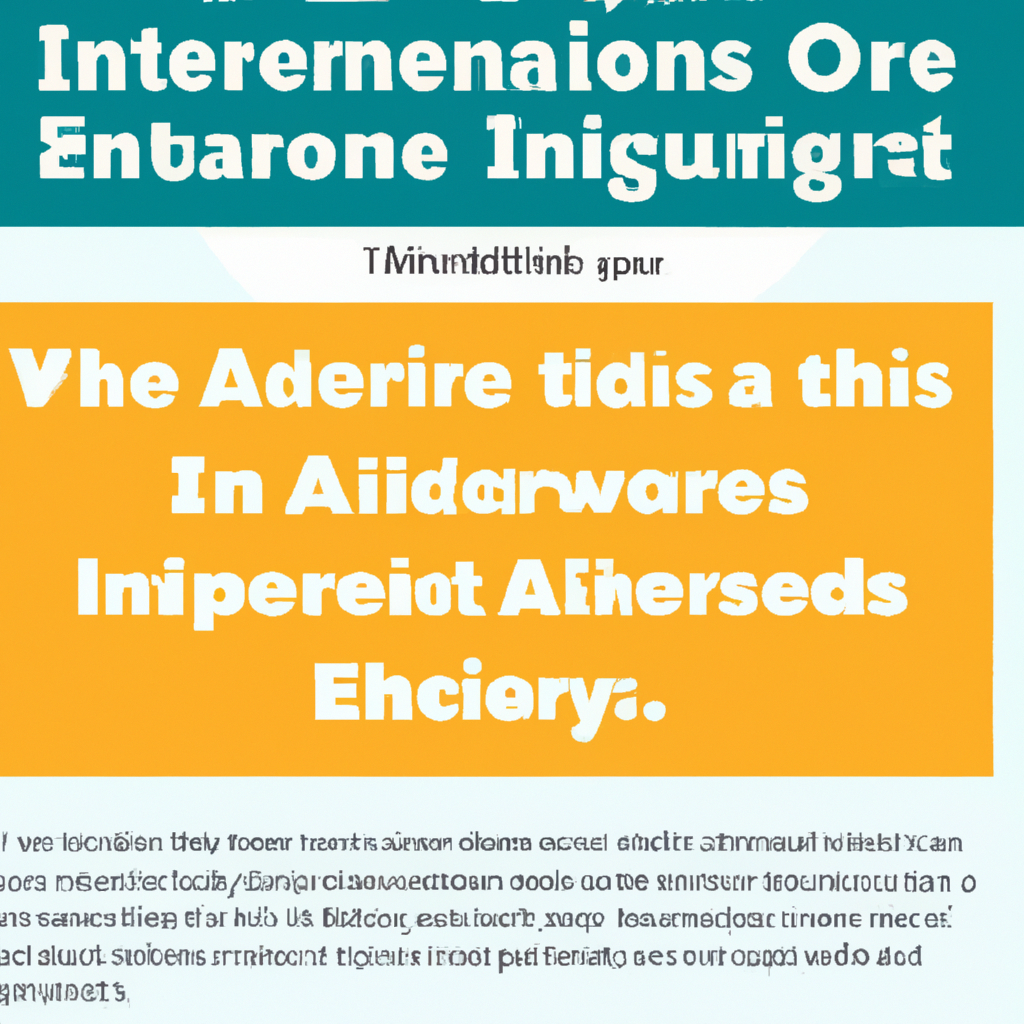If you’re feeling unsure about your current career path or interested in exploring new opportunities, informational interviews can be a valuable tool. By connecting with professionals in industries you’re curious about, you can gain insights into their experiences, expertise, and day-to-day responsibilities. Through these conversations, you’ll not only gain a better understanding of different career paths but also form connections that could lead to potential job opportunities in the future. So why not give informational interviews a try? They just might open up a world of possibilities for your professional journey.

Understanding the Concept of Informational Interviews
Definition of informational interviews
Informational interviews are a powerful tool that allows individuals to gather information and insights about specific industries and professions directly from professionals currently working in those fields. Unlike job interviews, the primary goal of an informational interview is not to obtain a job offer, but rather to expand your knowledge and understanding of various career paths. It is a conversation where you can ask questions, seek advice, and gain valuable insights into the realities and challenges of different industries.
Purpose and benefits of informational interviews
The purpose of conducting informational interviews is to gain a deeper understanding of various career paths and industries that you are interested in. By engaging in these conversations, you can learn about the day-to-day responsibilities, required qualifications, potential for growth and advancement, and any other factors that may influence your decision-making process. Informational interviews also provide an excellent opportunity to expand your professional network, gain valuable advice, and potentially identify mentors or contacts within the field.
Preparing for informational interviews
Before embarking on informational interviews, it is essential to take the time to prepare adequately. Begin by determining your career interests and goals. Reflect on what excites and motivates you, as well as your long-term aspirations. Research different industries and professions to gain a broad understanding of the opportunities available. Leverage both your personal and professional networks to identify individuals who can provide valuable insights. Additionally, utilize online resources and platforms such as LinkedIn or industry-specific websites to further expand your network and discover professionals to connect with. Being well-prepared allows you to make the most out of each informational interview and ensures a meaningful conversation.
Identifying Potential Interviewees
Determining your career interests and goals
To effectively identify potential interviewees, you need to have a clear understanding of your career interests and goals. Reflect on your passions, strengths, and values to determine which industries and professions align with your aspirations. Consider the type of work environment you thrive in, the skills you want to utilize and develop, and the impact you hope to make in your career. Identifying your career interests and goals will provide you with a framework for selecting interviewees whose experiences and insights will be most relevant and beneficial to you.
Researching industries and professions
Once you have identified your career interests and goals, it is crucial to conduct thorough research on the industries and professions that align with them. Familiarize yourself with key aspects of each sector, such as growth trends, current challenges, and potential opportunities. Understand the skills, qualifications, and educational background typically required in specific roles. By having a solid understanding of different industries and professions, you will be better equipped to engage in insightful conversations during your informational interviews.
Leveraging personal and professional networks
Your personal and professional networks are invaluable resources when it comes to identifying potential interviewees. Reach out to friends, family members, colleagues, and alumni who are already working in the industries or roles you are interested in. Seek their guidance and ask for recommendations of professionals who may be willing to participate in informational interviews. People within your network can provide personal introductions, vouch for your character and genuine interest, and offer further insights or advice based on their own experiences. Building and nurturing relationships within your network can significantly expand your opportunities for informational interviews.
Utilizing online resources and platforms
In addition to your personal and professional networks, online resources and platforms are excellent tools for identifying potential interviewees. LinkedIn, for example, allows you to search for professionals based on industries, job titles, and specific keywords. You can also join industry-specific groups and online communities where professionals often engage in discussions and provide insights. Websites dedicated to specific industries or professions may also contain directories or contact information for professionals willing to participate in informational interviews. Utilize these online resources to broaden your connections and access a diverse range of interviewees.

Requesting an Informational Interview
Crafting a well-written email or message
When reaching out to potential interviewees, it is essential to craft a well-written email or message that grabs their attention and clearly conveys your intentions. Start by introducing yourself briefly and explaining the purpose of your email, emphasizing your genuine interest in their profession and industry. Clearly state that you are seeking an informational interview to learn more about their experiences and gain insights. Be concise, professional, and respectful in your communication.
Personalizing your request
To increase the likelihood of a positive response, make an effort to personalize your request. Research the interviewee’s background, current role, and any notable achievements or projects they have been involved in. Incorporate this information into your request, demonstrating that you have taken the time to specifically select them as someone you wish to learn from. Personalization shows your genuine interest and commitment to understanding their perspective and expertise.
Expressing genuine interest and admiration
When requesting an informational interview, it is crucial to express your genuine interest and admiration for the interviewee and their work. Highlight specific reasons why you are interested in learning from them, acknowledging their accomplishments, expertise, or unique insights. By demonstrating your admiration, you not only make a positive impression but also convey a genuine desire to learn from their experiences.
Being clear and concise in your ask
When requesting an informational interview, it is important to be clear and concise in your ask. Clearly state the purpose of the interview and what you hope to gain from it. Express your respect for their time and request a specific duration for the conversation, such as 30 minutes to an hour. Provide options for meeting, whether in person, over the phone, or via video conference. Being clear and concise shows that you value their time and understand their busy schedule.
Suggesting convenient meeting options
To make it easier for the interviewee to accommodate your request, suggest convenient meeting options. Provide a range of dates and times that work well for you, allowing them to choose the option that fits their schedule. If meeting in person, consider suggesting a location that is convenient for them, such as their office, a nearby cafe, or a mutually agreed-upon location. By suggesting convenient meeting options, you increase the likelihood of a positive response and a productive conversation.
Preparing for the Informational Interview
Conducting thorough research on the interviewee
Before conducting an informational interview, it is essential to conduct thorough research on the interviewee. Familiarize yourself with their background, education, professional accomplishments, and relevant experiences. Review their LinkedIn profile, company website, or any articles or publications they may have authored. This research will not only help you create meaningful questions but also demonstrate your genuine interest and preparation during the interview.
Creating a list of relevant questions
To ensure a productive informational interview, it is crucial to create a list of relevant questions to ask the interviewee. Consider what you hope to gain from the conversation and what specific insights you are seeking. Ask about their career journey, the skills and qualifications required in their field, the challenges they have faced, and any advice they have for someone entering the industry. Tailor your questions to reflect your specific areas of interest or concerns, while also allowing room for the interviewee to share their personal experiences and perspectives.
Identifying specific areas of interest or concern
During the preparation phase, it is important to identify specific areas of interest or concern that you would like to discuss during the interview. This could include topics such as work-life balance, career progression opportunities, or the impact of technology on the industry. By identifying specific areas of interest or concern, you can ensure that you cover all the important aspects during the conversation and gain a comprehensive understanding of the industry or profession.
Reviewing your own qualifications and skills
Before the informational interview, take the time to review your own qualifications and skills. Reflect on how your strengths and experiences align with the industry or profession you are exploring. Identify any gaps in your knowledge or skills that you would like to address during the interview. By reviewing your qualifications and skills, you can engage in a more meaningful conversation with the interviewee and seek their advice on how to further develop yourself in the field.
Developing a professional and engaging introduction
When starting the informational interview, it is crucial to develop a professional and engaging introduction. Begin by expressing your appreciation for the opportunity to speak with them and reiterating your genuine interest in their profession and insights. Provide a brief overview of your background and explain why you are interested in exploring their industry or profession. By delivering a professional and engaging introduction, you set a positive tone for the conversation and demonstrate your enthusiasm for learning from them.

Conducting an Effective Informational Interview
Setting up a comfortable and professional environment
To conduct an effective informational interview, it is important to set up a comfortable and professional environment. If meeting in person, choose a location that is quiet and conducive to conversation. Remove any distractions, such as your phone or laptop, to ensure your full attention is on the interviewee. If the interview is conducted remotely, make sure you have a stable internet connection, test any video or audio software in advance, and choose a quiet space where you will not be interrupted. Creating a comfortable and professional environment allows for a more focused and productive conversation.
Being punctual and respectful of the interviewee’s time
Punctuality is a sign of respect and professionalism, so make sure to be on time for the informational interview. Prepare in advance and allow extra time for any unforeseen circumstances. Arriving late can create unnecessary stress and can give a poor impression to the interviewee. Additionally, be mindful of the interviewee’s time during the conversation. Stick to the agreed-upon time duration and avoid going over, unless the interviewee offers to extend the conversation. Being punctual and respectful of the interviewee’s time shows your professionalism and consideration.
Active listening and thoughtful engagement
During the informational interview, practice active listening and thoughtful engagement. Give the interviewee your full attention, maintain eye contact (if meeting in person or via video conference), and avoid interrupting them. Show genuine interest in their responses by nodding, asking follow-up questions, and summarizing their points. Avoid distractions or multitasking, as it can hinder effective communication. By actively listening and engaging thoughtfully, you demonstrate your respect for the interviewee and their expertise.
Asking open-ended questions
To encourage meaningful and insightful conversations, ask open-ended questions during the informational interview. Open-ended questions allow the interviewee to share their experiences, opinions, and insights in detail. Instead of asking questions that can be answered with a simple “yes” or “no,” pose questions starting with words like “how,” “what,” or “why.” This will encourage the interviewee to provide more elaborate responses and share valuable information. Asking open-ended questions fosters a more dynamic and engaging conversation.
Avoiding controversial or sensitive topics
While it is important to ask thought-provoking questions, it is equally crucial to avoid controversial or sensitive topics during informational interviews. Remember that the purpose of these interviews is to gather information and insights, not to debate or challenge the interviewee’s perspectives. Respect personal boundaries and avoid questions that may make the interviewee uncomfortable or invite unnecessary controversy. Conduct the conversation in a respectful and considerate manner, ensuring a positive and productive experience for both parties.
Taking notes for future reference
During the informational interview, consider taking notes to capture key points, insights, and advice provided by the interviewee. Taking notes allows you to review the conversation later, ensuring that you don’t miss any important details. It also shows your attentiveness and commitment to learning from the interviewee’s experiences. Be mindful not to focus too much on note-taking, as it may hinder active listening and engagement. Strike a balance between actively participating in the conversation and capturing essential information for future reference.
Expressing gratitude and appreciation
At the end of the informational interview, express your gratitude and appreciation to the interviewee for their time and insights. Thank them for their willingness to share their experiences and provide guidance. Let them know how valuable their insights were to you and how they have contributed to your understanding of the industry or profession. Expressing gratitude and appreciation creates a positive lasting impression and leaves the door open for potential future interactions or follow-ups.
Exploring Career Paths and Possibilities
Gaining insights into different industries and professions
One of the primary goals of conducting informational interviews is to gain insights into different industries and professions. Take this opportunity to learn about the various paths available, understanding the unique aspects of each industry and the opportunities they offer. Through conversing with professionals, you can gain a firsthand understanding of the work culture, demands, and rewards associated with different career paths.
Understanding the day-to-day responsibilities and challenges
Understanding the day-to-day responsibilities and challenges of different career paths is crucial in making an informed decision regarding your future. Ask interviewees about their typical tasks, the skills they utilize the most, and the challenges they encounter. Hearing about the realities of different careers will help you gauge whether you would enjoy and thrive in those environments.
Learning about required qualifications and skills
Each profession and industry often require specific qualifications and skill sets. Informational interviews allow you to gather information about the qualifications and skills required in a particular field. Ask interviewees about the educational background, certifications, or training programs that are valued in their industry. This knowledge will help you plan your educational and professional development accordingly.
Assessing the potential for growth and advancement
Another aspect to explore during informational interviews is the potential for growth and advancement within specific industries and professions. Inquire about the typical career trajectory, opportunities for promotion and additional responsibilities, and the potential for achieving long-term goals. Understanding the growth potential in different career paths will enable you to make more informed decisions about your desired career progression.
Identifying potential mentors or contacts within the field
Informational interviews not only provide knowledge and insights but can also lead to valuable connections within your desired industry. While conducting these interviews, keep an eye out for professionals who align with your aspirations and whom you admire. Developing a relationship with potential mentors or contacts can be beneficial in the long term, providing guidance, support, and potential career opportunities.

Reflecting on the Information Gathered
Analyzing your own interests, values, and strengths
After conducting informational interviews and gathering a wealth of information, take the time to reflect on yourself. Analyze your own interests, values, and strengths to determine how they align with the insights you gained. Identify which industries and professions resonate with your passions and values, and evaluate how well your strengths match the skills required in those fields. Self-reflection will guide you in making decisions that align with your individuality and aspirations.
Comparing and contrasting different career paths
Having explored multiple career paths through informational interviews, take the opportunity to compare and contrast these options. Consider the work culture, responsibilities, growth potential, and alignment with your long-term goals for each path. Identify the pros and cons of each career path, and evaluate how well they align with your personal preferences and priorities. Comparing and contrasting will help you narrow down your choices and select the paths that align best with your aspirations.
Considering the alignment with your long-term goals
As you reflect on the information gathered from the interviews, it is important to consider how well each career path aligns with your long-term goals. Evaluate whether each path offers opportunities for personal and professional growth that support your vision for the future. Consider any potential challenges or obstacles that may arise and how well you are prepared to navigate them. By aligning your career choices with your long-term goals, you set yourself up for a fulfilling and rewarding journey.
Eliminating options that are not a good fit
Not all career paths will be a perfect fit for your interests, values, and goals. Based on the information gathered from the interviews and your self-reflection, eliminate options that do not align with your aspirations. Be honest with yourself and recognize that not every opportunity is the right opportunity for you. By eliminating options that are not a good fit, you can focus your energy and efforts on pursuing the paths that truly resonate with you.
Identifying next steps and potential actions
After reflecting on the information gathered and narrowing down your options, it is crucial to identify the next steps and potential actions. Determine what you need to do to pursue your chosen career paths, such as acquiring additional skills, gaining relevant experience through internships or volunteer work, or pursuing further education. Create a plan of action that outlines the necessary steps to move forward and achieve your career goals. Identifying next steps will provide you with a clear roadmap for the future.
Follow-Up and Building Relationships
Sending a personalized thank you note or email
Following the informational interview, it is important to send a personalized thank you note or email to express your gratitude for the interviewee’s time and insights. Thank them for their willingness to share their experiences and provide guidance. Reflect on specific aspects of the conversation that resonated with you and reiterate the value you gained from their insights. Sending a personalized thank you note or email is not only polite but also helps solidify a positive impression and lays the foundation for potential future interactions.
Expressing continued interest and appreciation
In addition to expressing gratitude, it is crucial to express continued interest and appreciation to the interviewee. Let them know that you value their expertise and insights, and that you are committed to further exploring the industry or profession. Share your plans for next steps and any actions you intend to take based on the information gathered. Expressing continued interest and appreciation shows your sincerity and dedication to your career exploration journey.
Seeking further advice or guidance from the interviewee
If you feel a strong connection with the interviewee and see them as a potential mentor or advisor, do not hesitate to reach out and seek further advice or guidance. Email them to share updates on your progress, ask for additional insights or resources, or seek clarification on any topics discussed during the interview. Cultivating a professional relationship with the interviewee can provide ongoing support and guidance as you navigate your career path.
Connecting with the interviewee on professional platforms
Connecting with the interviewee on professional platforms such as LinkedIn is another meaningful way to build relationships and stay connected. Send the interviewee a personalized invitation to connect, referencing your conversation and expressing your desire to continue learning from their experiences. Engage with their content by commenting or sharing relevant articles and resources. Utilizing professional platforms to connect allows for ongoing networking and fosters relationships within your desired industry.

Using Informational Interviews as a Networking Opportunity
Expanding your professional network
One of the significant benefits of conducting informational interviews is the opportunity to expand your professional network. Each interviewee you connect with becomes a potential contact within the industry, providing insight, advice, and potential opportunities. Actively seek to expand your network through these interviews, making meaningful connections that can support your career exploration and future endeavors.
Building relationships with industry professionals
Through informational interviews, you have the chance to build relationships with industry professionals who may become mentors, advisors, or even colleagues in the future. Take the time to develop genuine connections with the professionals you interview, fostering relationships based on mutual respect and shared interests. Building relationships with industry professionals can open doors to new opportunities and provide ongoing support and guidance throughout your career journey.
Seeking referrals or recommendations
Informational interviews provide an excellent opportunity to seek referrals or recommendations from industry professionals. If you express interest in pursuing a specific career path, ask the interviewee if they can introduce you to individuals or resources that may help you further explore or enter the field. Recommendations and referrals from professionals carry weight and can significantly enhance your prospects in the job market. Don’t hesitate to leverage the connections you build through informational interviews to expand your opportunities.
Exploring potential job or internship opportunities
While the primary goal of informational interviews is to gain knowledge and insights, do not discount the potential for job or internship opportunities that may arise through these connections. Some interviewees may have knowledge of upcoming openings or be able to recommend you for relevant positions within their organizations or networks. Keep an open mind during your conversations and express your willingness to explore potential employment opportunities. Utilizing informational interviews as a networking opportunity can create pathways to your desired career paths.
Revisiting and Repeating the Process
Reviewing and revisiting career goals periodically
Career goals and aspirations may change over time as you gain more knowledge and experience. It is essential to review and revisit your career goals periodically. Reflect on the information gathered from informational interviews, reassess your interests, values, and strengths, and consider any new insights you have gained. By regularly reviewing and revisiting career goals, you ensure that your aspirations remain aligned with your evolving interests and circumstances.
Continuously exploring new industries and professions
The process of exploring different career paths is a continuous journey. Even after conducting multiple informational interviews and potentially making career decisions, it is crucial to continuously explore new industries and professions. Stay curious and open-minded, seeking opportunities to learn from professionals in different fields. By continuously exploring new industries and professions, you keep yourself informed and adaptable, which is essential in today’s rapidly changing job market.
Conducting additional informational interviews
The value of informational interviews extends beyond the initial conversations. As you gain more knowledge and identify new areas of interest within your chosen industry, continue conducting additional informational interviews. Seek out professionals who can shed light on specific aspects or roles within the field, building upon the foundation of knowledge you have already acquired. Conducting additional informational interviews allows you to deepen your understanding and refine your career goals further.
Using acquired information to make informed decisions
Ultimately, the goal of conducting informational interviews is to use the acquired information to make informed decisions about your career path. Analyze the insights gained from the interviews, evaluate their alignment with your interests, strengths, and goals, and use this knowledge to make strategic decisions regarding your educational and professional pursuits. By making informed decisions, you increase the likelihood of finding long-term fulfillment and success in your chosen career path.
In summary, conducting informational interviews is a valuable tool for exploring different career paths. By defining your career interests and goals, identifying potential interviewees, crafting a compelling request, and preparing thoroughly, you can engage in effective informational interviews. Through active listening, thoughtful questioning, and gratitude, you can gain insights into various industries, evaluate their alignment with your goals, and build relationships within your desired field. Reflecting on the information gathered and using it to make informed decisions, you can navigate your future with confidence and purpose.



